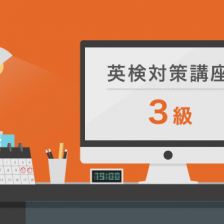この講座では、「英検2級」合格を目指す皆さんを対象に、試験で出題された問題を紹介し、その解き方について分かりやすく解説していきます。
大問3 長文の内容一致選択問題
「大問3 長文の内容一致選択問題」について学習します。
問題を解いたら、次ページの解答・解説を読み、きちんと理解するようにしましょう。
大問3では、長文が[A]、[B]、[C]の3題出題され、設問によりそれぞれの内容が問われます。設問の数は[A]が3問、[B]が4問、[C]が5問です。[A]はEメールの問題で、[B]と[C]は歴史・文化・社会・自然・科学・環境などのトピックの問題です。
Questions ~問題~
次の英文の内容に関して、(1)から(4)までの質問に対して最も適切なもの、または文を完成させるのに最も適切なものを1, 2, 3, 4の中から一つ選びなさい。
[英検 2016年度 第3回検定問題より]
SuperAgers
People around the world are living longer. One problem that affects many older people, though, is memory loss. Usually, this is just an inconvenience, but it can be a sign of brain disease. Scientists have been studying the brains of people suffering from memory loss in the hope of finding a way to treat the problem. Researchers at Northwestern University in Chicago, however, decided to take a different approach. They began looking at the brains of people who still have strong and healthy memories even as they get older.
The team of researchers calls these people "SuperAgers." The researchers asked people over the age of 80 who believed they had unusually good memories to take part in the project. To determine if these people truly had good memories, the researchers first tested a group of people between the ages of 50 and 65. Then, they gave the same test to the people over 80 and compared the results. All those who scored as well as the younger group were considered to be SuperAgers. This, however, only amounted to about 10 percent of those who had volunteered.
After this, the brains of the younger group and those of the SuperAgers were scanned. The researchers were surprised to find that the brains of the SuperAgers looked just as healthy as―and in some ways healthier than―those of the younger group. In particular, the outer layer of the brain, known as the cortex, was thicker than the people in the younger group. This part of the brain is connected to both memory and thinking. Moreover, the part of the brain that helps people pay attention was also thicker than is normally the case with older people.
The SuperAgers not only had good memories but were also more energetic and active than other people the same age. This goes along with other studies which have shown that people who participate in many activities and are involved in their communities are less likely to suffer from brain problems. What scientists do not yet know, though, is whether such people are born with genetically stronger brains or whether it is their diet and lifestyle that keep their brains healthier.
(1)
What are researchers at Northwestern University doing about memory loss?
- They are studying the brains of people who have good memories in their old age.
- They are focusing on cases where memory loss is not caused by brain disease.
- They are trying to reduce the effects of brain diseases on people's memories.
- They are looking for a way to reduce the inconvenience of memory loss.
(2)
In the study, "SuperAgers" were defined as
- people over 80 who answered at least 10 percent of the test questions correctly.
- people over 80 whose memories are as good as people in their 50s and early 60s.
- people between 50 and 65 whose memories are better than average for their age.
- people between 50 and 65 who are likely to live a healthy life through their 80s.
(3)
What were researchers surprised to learn about the SuperAgers?
- They got along better with younger people than with people of their own age.
- They had better memories than others but are not as good at paying attention.
- There were no differences between their brains and those of other people their age.
- The part of their brains related to memory and thinking was unusually healthy.
(4)
What does evidence from a variety of studies suggest?
- Some people are unlikely to be able to improve their memories through practice and exercise.
- Most people with strong brains are genetically different from people with normal brains.
- Living an active and social life is related to the health of people's brains.
- Eating healthily before exercising has a positive effect on people's memories.
学習アドバイス
英語を教えていると、「英語の長文の勉強の仕方が分からないのですが、どうすればいいのですか」と聞かれることがあります。「英語の長文の勉強法」はいくつか考えられますが、ここでは一番オーソドックスなやり方を紹介します。
まずは普通に長文を読んで、与えられた問題を解いてください。その後、答え合わせをして、解説もしっかり読んでください。正解できたかもしれませんし、不正解だったかもしれません。
一通り問題を解き終わったら、その問題の長文をはじめから読み直します。今度は辞書(英和中辞典)を使って、じっくりと読んでいきます。一文一文、頭の中で日本語に直せるかどうか、意味が分かるかどうか自分で確かめながら読んでいってください。日本語に直せなかったり、意味が分からなかったりした場合には、その度ごとに納得のいくまで、何度も辞書を引いて確認してください。
最後に、答えの全訳がある場合は、自分自身の解釈が正しかったのかどうか、確認してください。
辞書を使って単語、熟語、構文を調べたときに、それらをノートに書き留めて、自作の単語・熟語・構文帳を作るのも有意義なことです。
時間に余裕のある方は、時々は紙に自分の訳を書き出してみると良いでしょう。パソコン上でも構いません。
これらの作業を繰り返していくことで、英語の長文の読解力は確実に上がっていきます。
おすすめ記事
-

2022/09/30
- 英検対策講座【2級】大問3: 長文の内容一致選択問題
- 「英検2級」の過去問を紹介し、その解き方について分かりやすく解説します。過去問を解いたら、次ページの「解答・解説」をしっかり確認しましょう。
2級
-

2022/09/30
- 英検対策講座【準2級】大問3: 長文の語句空所補充
- 「英検準2級」の過去問を紹介し、その解き方について分かりやすく解説します。過去問を解いたら、次ページの「解答・解説」をしっかり確認しましょう。
準2級
-

2022/09/30
- 英検対策講座【3級】大問3: 長文の内容一致選択問題
- 「英検3級」の過去問を紹介し、その解き方について分かりやすく解説します。過去問を解いたら、次ページの「解答・解説」をしっかり確認しましょう。
3級

